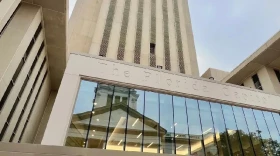The largest manufacturer of slide projectors, Kodak, stopped making the devices last fall, part of the company's new focus on digital cameras. While slides are passing out of common use, their artistic side is being celebrated in a new exhibit at the Baltimore Museum of Art.
The "Slide Show" exhibit takes up 12 darkened rooms at the museum. Curator Darsie Alexander has put together what's believed to be the first major exhibition of slide art, presenting works from the1960s to the present -- more than 2,500 slides in all.
To see every image here would take hours. Famous artists are featured, as well as names that might not be so well known. Yet for each, there's a sense of the familiar.
"You see as you walk through the galleries a kind of play on the family slideshow or the trade show display, or the art history lecture or illustrated science class," Alexander tells Susan Stone. "The artists are making references to those familiar uses of slides, which are no longer so familiar."
The slide show's history goes back centuries, and actually predates photography. Starting around 1700, traveling "magic lantern" shows -- featuring hand-painted images projected with lamp and candle light -- shocked and delighted audiences.
Todd Gustavson, technology curator at the George Eastman House in Rochester, N.Y., says the modern slideshow era married performance with sharing images. To him, the end of that era marks a cultural loss. "I think in a way if we lose the projection, we're sort of losing the storyteller," he says.
The Baltimore Museum of Art's "Slide Show" exhibition can be viewed until mid-May, then it moves on to Cincinnati and New York City.
Copyright 2022 NPR. To see more, visit https://www.npr.org.




